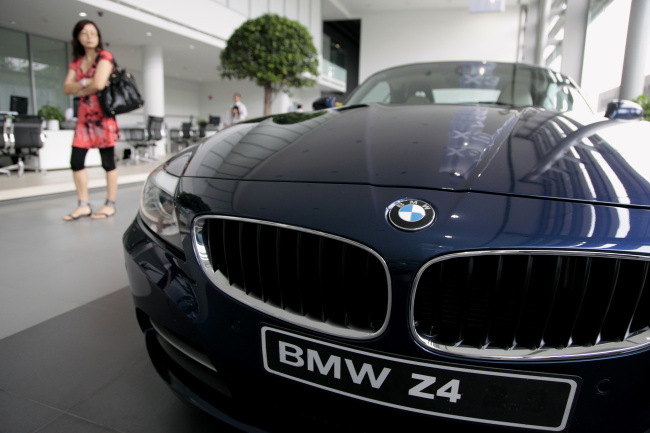BMW adds currency hedges with VW to mitigate volatility
By Korea HeraldPublished : April 14, 2013 - 19:51
Bayerische Motoren Werke AG and Volkswagen AG increased their currency hedging in 2012 to reduce the risk that foreign-exchange market swings would harm revenue, according to annual reports from the German carmakers.
BMW, the world’s biggest maker of luxury cars, raised its protection in foreign-exchange markets by 39 percent from the previous year to 36 billion euros ($47 billion), according to the report published on March 19. Volkswagen, Europe’s biggest automaker, boosted hedges by 27 percent to 103 billion euros.
“We deliberately have taken out the risk in a situation where there are so many markets here at risk,” Friedrich Eichiner, the chief financial officer of Munich-based BMW, said on a March 20 conference call with analysts. “You don’t want to see huge currency risk.”
Companies are stepping up efforts to protect against price swings in the $4 trillion-a-day currency market amid rising volatility fueled by a slump in the yen and a dollar rally. That’s creating opportunities for the biggest currency traders, with JPMorgan Chase & Co., the largest U.S. bank by assets, hiring staff to boost its corporate business.
BMW, the world’s biggest maker of luxury cars, raised its protection in foreign-exchange markets by 39 percent from the previous year to 36 billion euros ($47 billion), according to the report published on March 19. Volkswagen, Europe’s biggest automaker, boosted hedges by 27 percent to 103 billion euros.
“We deliberately have taken out the risk in a situation where there are so many markets here at risk,” Friedrich Eichiner, the chief financial officer of Munich-based BMW, said on a March 20 conference call with analysts. “You don’t want to see huge currency risk.”
Companies are stepping up efforts to protect against price swings in the $4 trillion-a-day currency market amid rising volatility fueled by a slump in the yen and a dollar rally. That’s creating opportunities for the biggest currency traders, with JPMorgan Chase & Co., the largest U.S. bank by assets, hiring staff to boost its corporate business.

BMW deliveries in China, including vehicles shipped from Germany, climbed 40 percent to 327,341 vehicles last year, while Volkswagen AG’s Audi saw sales, including in Hong Kong, gain 30 percent to 405,838 units, according to the companies.
While BMW, also the maker of Mini and Rolls-Royce brand vehicles, says it mitigates currency risks by manufacturing cars in its biggest target markets, such as China and the U.S., the company anticipates having to convert 8.4 billion euros of renminbi revenues and 5.3 billion euros of dollar revenues back into its home currency this year, it said in its annual report.
BMW’s new hedges are almost exclusively forward contracts, while in 2011 it added 8 billion euros of currency options and only 2.5 billion euros of forwards, according to the report.
“We do not anticipate any significant impact on earnings from changes in transaction rates,” BMW spokesman Alexander Bilgeri said in an e-mailed statement. “We have already been active with regard to 2014 and have hedged over half of our exposures.”
The yen dropped 22 percent in the past six months, the worst performer among 10 developed-nation currencies tracked by Bloomberg Correlation Weighted Indexes, as the Bank of Japan focused on measures to end years of deflation. The dollar gained 1 percent, according to the indexes. Three-month implied volatility on the dollar against the yen rose to 13.6 percent on April 9, the highest since March 2011.
China’s yuan completed a seventh weekly advance against the dollar as the central bank set a record reference rate for the currency.
Volkswagen told analysts last year that it limited currency hedging to mostly short-term contracts for cost reasons. Of the 21.7 billion euros of currency hedges it bought last year, 12.3 billion euros were option contracts, and two-thirds had a maturity greater than one year.
“We’re highly hedged short-term and then, of course, in the future, the hedge rates move down somewhat,” the company’s Chief Financial Officer Hans Dieter Poetsch said on a July 26 earnings call. “We have a very significant basket of currencies where hedging is either not really possible or is just too expensive.”
(Bloomberg)
-
Articles by Korea Herald



![[Weekender] Pet food makers bet big on ‘recession-free’ pet food market](http://res.heraldm.com/phpwas/restmb_idxmake.php?idx=644&simg=/content/image/2024/05/10/20240510050754_0.jpg&u=20240512145510)



![[Drama Tour] Romantic trip to ‘Queen of Tears’ filming spots](http://res.heraldm.com/phpwas/restmb_idxmake.php?idx=644&simg=/content/image/2024/05/09/20240509050798_0.jpg&u=20240511190213)











